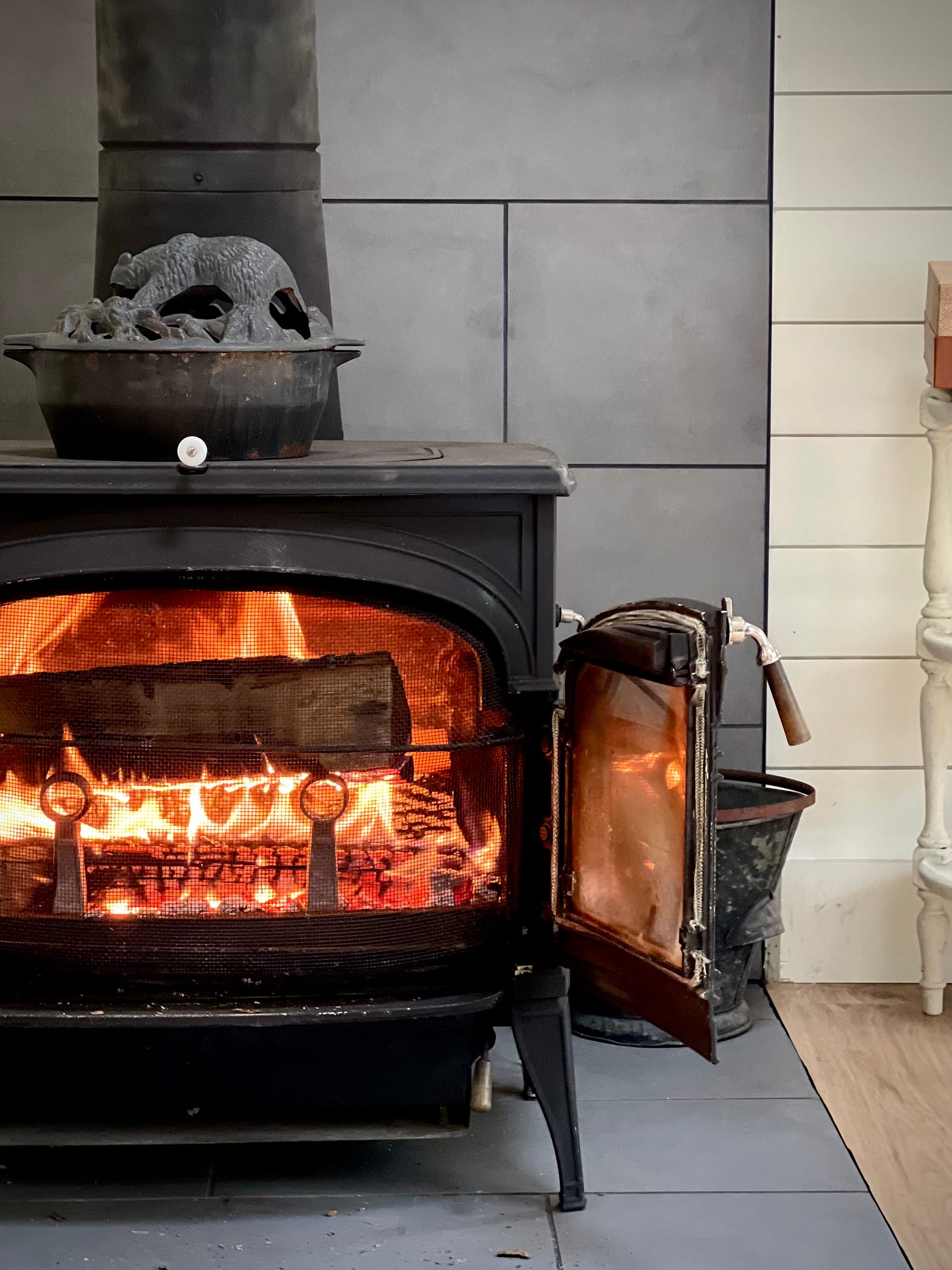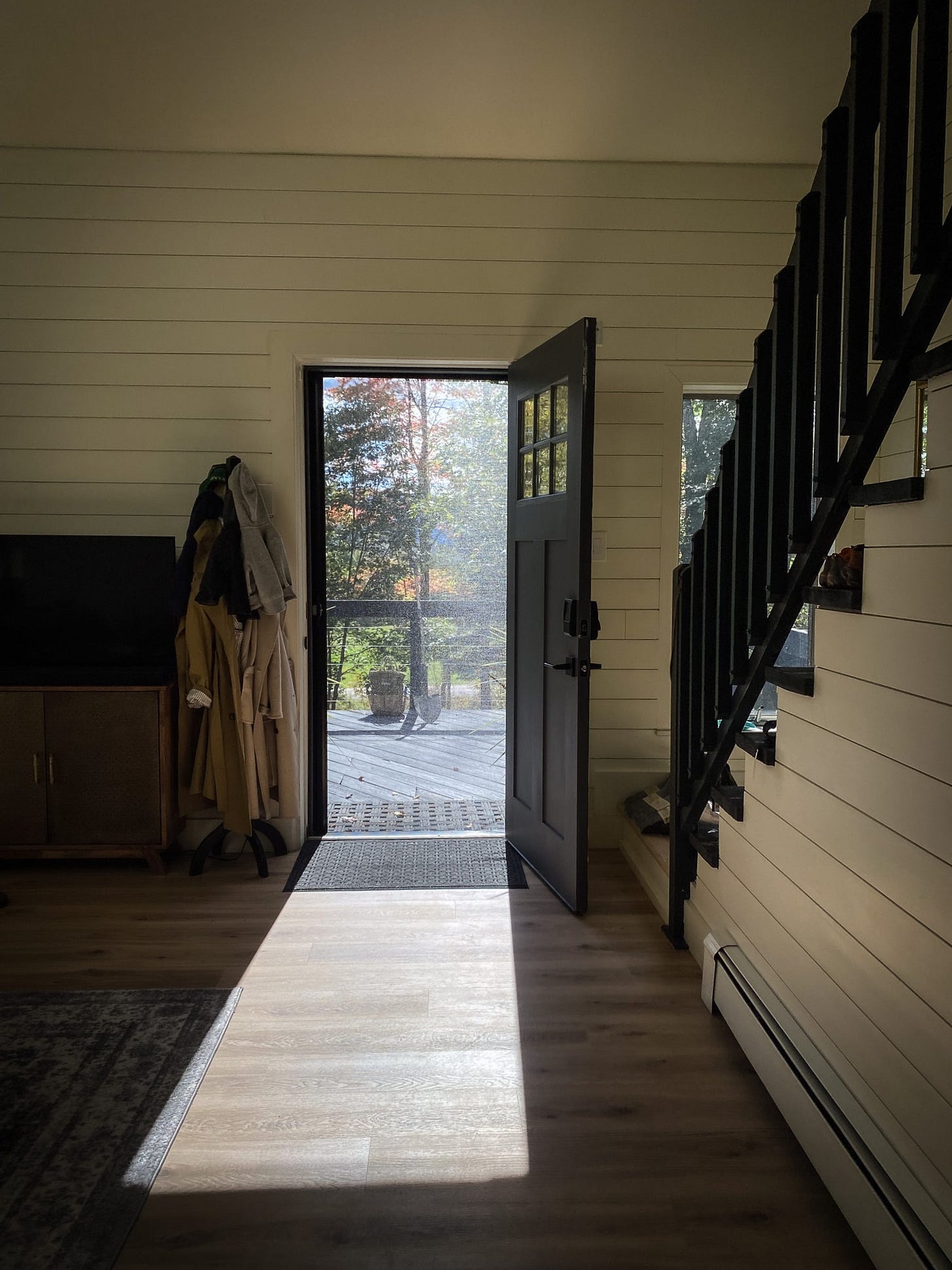Paid subscribers can hear me read this essay by clicking the player at the bottom of the page!
I’m not sure you’re able to fully appreciate winter unless you have a good home. After the excursions of summer, and even the crisp, inviting days of autumn, nature forces us to walk back into home (at least for those of us who live with four seasons) and make peace with the indoors. There, with any luck, we find comfort from the elements. The cold, snow and darkness lose their menace and simply become atmosphere beyond the windows, enhancement to a cultivated coziness. The home, if it’s a good one, blares bright in the face of the harsh realities outside its doors.
A good home, of course, doesn’t mean the biggest house with the most expensive decor. Legions of wealthy people live in luxury, yet their home lives are as inhospitable as a winter night outdoors. A good home is one where both strangers and those who live inside of it feel welcomed and held. It’s a space where you know you’re safe even when the world around you may not be. During the lockdowns of 2020, my thoughts often travelled to those who were being forced to stay inside homes that were not good—homes where they were victims, preyed upon by others, homes where there was drug use and other types of violence. With the escape of school, the streets, or a relative’s home taken from them, many people were trapped in terrible situations. A bad home is literally a nightmare; for someone who lives in one, there’s no respite from darkness and never comfort nor safety. And if that’s the truth, then the opposite is also true, which is that a good home is a space where beautiful things grow, where we cultivate strength before heading out into an indifferent world, and where we can rest easy when returning.
In a recent post, I wrote that my ideal life pace is akin that of Little House on the Prairie and that my aim is to live surrounded by nature, and barely leave home. When I wrote that part about barely leaving home, I chuckled, and then reached for the delete key to erase it. I can’t write that, I thought, it makes me sound…What, exactly? Well, it makes me sound like a homebody, and in a time when international travel happens with ease, and Instagramable vacations in exotic places are the norm, us homebodies seem like the unmotivated type.
Don’t you want to see the world? the zeitgeist asks, with wanderlust on its panting breath.
You know, kind of, but then again, I’m sort of good right where I am. It sounds kind of sacrilege to admit, doesn’t it?
About fifteen years ago I sat with a friend at a bar who had just been awarded a Fulbright Fellowship to Vietnam. She was the starry-eyed traveler type. With her sketchbook in hand, she wanted to see the world and have adventures far from the known of her suburban upbringing.
Don’t you want to travel? she asked me.
I’ve been to Italy, I said. I’d like to go again.
But don’t you want to see the world? All kinds of cultures and countries?
I paused, hand wrapped around my cocktail.
I mean, theoretically, sure. I’d love to see Japan, and a place like Russia, but if I don’t, that’s okay, too. There’s a lot of life right here.
I thought of Dorothy, whose story has been a fixture of my imaginative world since I was a very little girl, heading on her long adventure only to circle back and wake to the realization that there’s no place like home, and that if she ever went looking for her heart’s desire again, she need only look in her own backyard. My friend and I sat talking at a time when I’d securely returned home after a scattering of years where I bought into the idea that being independent, being modern, being artistic meant I had to leave behind familial values, as well as my hometown. I’d bought into the idea that in order to be creative, I had to be a rolling stone, without attachment, without roots. Yet, all my traveling and adventures hadn’t yielded any magical or earth shattering results. I went out thinking I’d find gold, but when I opened my hands, I held little but dust. Then my father abruptly died, and I’d spent the last several years of his life living a thousand miles away for no good reason except that it seemed the liberated thing to do. I felt betrayed by my own decisions; duped by a narrative I’d swallowed as my truth.
While the benefits of travel are well and good, and I think valid—it gets us to see things differently, it breaks us out of our monotony—it’s also true that one of the chief benefits of travel for many of us is this: It makes us appreciate home again, and we can’t wait to get back to it.
In his essay, “On Family Work,” the American farmer and writer Wendell Berry writes, “TV and other media have learned to suggest with increasing subtlety and callousness—especially, and most wickedly, to children—that it is better to consume than to produce, to buy than to grow or to make, to go out than to stay home. If you have a TV, your children will be subjected almost from the cradle to an overwhelming insinuation that all worth experiencing is somewhere else...”
This had certainly been my experience. Even though I’d always been fiercely attached to both family and homelife, I felt I had to go. The messaging, which claimed that if I only listened would lead me to myself, in fact forced me away from myself.
My friend was flabbergasted at my response. It was very un-modern, decidedly old-fashioned. Didn’t I realize that women had been fighting to leave home for decades? Didn’t I realize that home was the place where we’d been subjugated? But I no longer saw home through that lens. For me, it was the place where one belonged. The place where one could feel at ease, and yes, in that safety, creative and inspired.
Even when travelling and living in other places, as a writer especially, I largely felt that homelife—the complexities of relationships, the workings of a family, the magic and burden of custom and tradition—were plenty of fodder for a legion of books. When I look back at what I wrote during those years, the stories were, as now, largely focused on tradition, culture and family. Every artist has themes that act as a fulcrum for their work; these seem to be mine, no matter how hard I’d tried to escape them.
When I started writing this essay, Los Angeles hadn’t yet burned to the ground. As I finish writing, nearly two weeks of fire has been ravaging the city and its inhabitants. If you need a reminder of how important home truly is, just look to people who have swiftly, unexpectedly lost theirs. The heartbreaking clips of people wandering the street they once lived on, looking primordially stunned, utterly unable to fathom the blink-of-an-eye loss of the one space on this planet where they were held, where they belonged, brutally highlights this truth. The wealthy, of course, will likely rebuild their multi-million dollar homes, but it’s the middle and working class people, the families who’ve passed these homes down through the generations, who will be robbed of their roots. They most likely will not rebuild, as the truth is they most likely wouldn’t have been able to purchase their homes in a place like Los Angeles to begin with if the houses hadn’t been bought decades ago, when attaining the American Dream was much more a reality. Under the control of a government and shadowy ethos that increasingly seems to want to push us into cities, into apartments owned by other people, off land and into concrete quadrants, monitored by all manner of cameras and digital footprints, away from land that we have a stake in, whether by birthright or because we have become stewards of it, thousands of people being displaced is much more than a news story. It’s a mark in the scorecard of history. Shadowy ethos one, regular people, zero. A home, in the face of this, is much more than shelter. It’s a space of defiance and self protection.
So if you’re one of the lucky people who have a home right now—a good home, most importantly—don’t be afraid to nestle into it. Don’t be afraid to find satisfaction within its walls. You don’t have to buy anything. You don’t have to go anywhere. You don’t even have to post it to Instagram. Just be inside of it, without apology, like a little bird in its winter nest. The light and joy and comfort you create within its walls, that’s enough of a gift to this dark world. In fact, it may be the very greatest and most needed gift of all.
Thanks for being here with me, truly.







